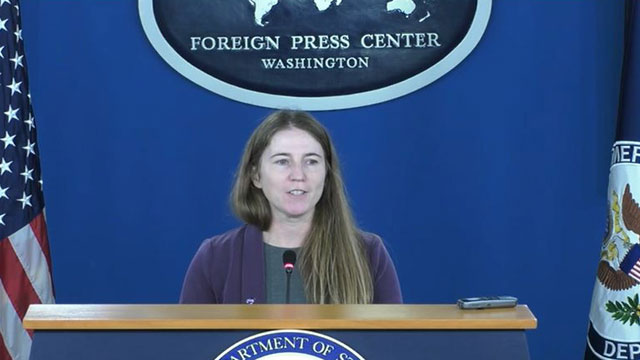The primary goal of a lot of our technology development is about our own space missions and space operation, but one of our missions includes benefits to humanity, Dr. Katherine Calvin, chief scientist and senior climate advisor for NASA, has said.
Dr. Katherine Calvin said, “NASA has a partnership with USAID called SERVIR where we work with local communities in Asia, Latin America, and Africa to help use satellite observations to tackle real-world problems where they live. And so we’re trying to work with local communities about meeting their needs.”
The NASA chief scientist made the remarks at a briefing held at Foreign Press Center on Wednesday while replying to a question on climate change’s effect on Bangladesh.
In the briefing, State Department Correspondent M Mushfiqul Fazal asked, “Bangladesh is a very vulnerable country for climate change, and what benefit Bangladesh can get from this as Bangladeshis – many people are suffering from this, the climate change issues? And everybody’s taking – talking about adaptation and mitigation, but we need more in technological support, and the funding as well. So what benefit can this – Bangladesh get from this? What is your opinion?”
In reply, Dr. Katherine Calvin said, “The research that NASA does is global in scope, so we have information both from our observations and our models that are covering the entire globe. And similarly, our technology development – we develop a lot of technologies here at NASA.”
“The primary goal of a lot of our technology development is about our own space missions and space operation, but one of our missions includes benefits to humanity, so we’re continually thinking about how what we develop and use can help people all around the world. And I mentioned some of the crop research. We also have – we have a water-processing system on the International Space Station that’s been used around the world to provide clean water in communities that don’t have it.”
The NASA chief scientist further said, “I also want to mention internationally we have a partnership with USAID called SERVIR where we work with local communities in Asia, Latin America, and Africa to help use satellite observations to tackle real-world problems where they live.”
“And so we’re trying to work with local communities about meeting their needs. But all of our information is global and public, and we’re working to make it easier to use and so that people have the information and resources that they need,” said Dr. Calvin.
Video : FPC, State Department
MN/





